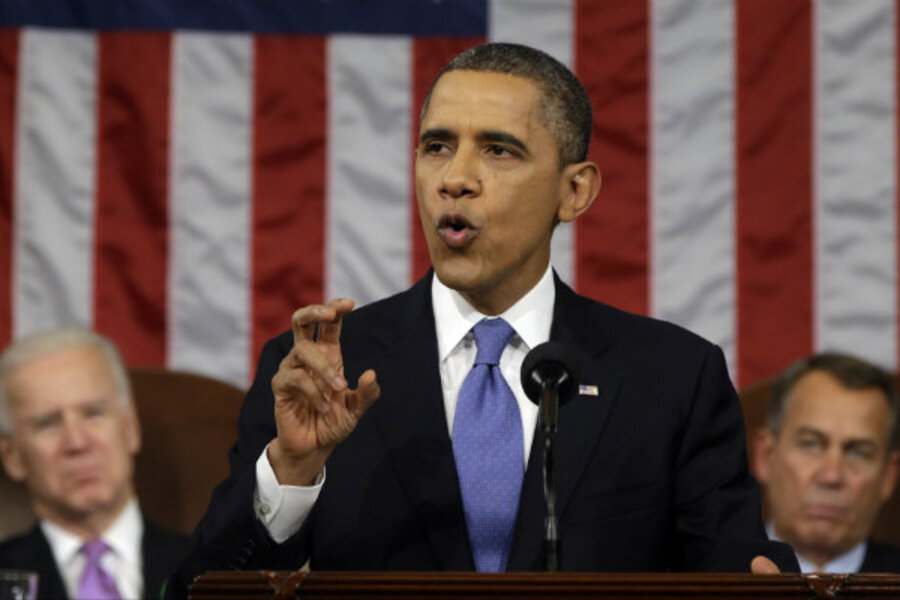State of the Union: US needs a statesman, but Obama played politics as usual
Loading...
| Wheaton, Ill.
To many, the state of America’s union is fractious. Distrust, disdain, and suspicion permeate American politics. Divisions within and between the two major parties have stymied the legislative process.
Last night in his State of the Union address, President Obama had the opportunity to rise above the partisan bickering and distrust and set a positive tone for his final term. What could have been a triumph of statesmanship was instead an all-too-common display of politics as usual.
Traditionally, presidents hope to accomplish three goals in a State of the Union address. They assess the current situation facing the country, present a political agenda for the coming year, and reaffirm underlying values. In sum, the speech should artfully connect the past, present, and future and solidify the president’s role as a political leader.
Last night, Mr. Obama failed to meet these goals. In the midst of an ongoing budget crisis, he devoted most of his speech to announcements of expensive new proposals. More than 8 million Americans remain unemployed, but instead of casting a vision of a clear set of actionable priorities for the coming legislative year, he offered a laundry list of initiatives – and no answer for how to pay for them.
After promising to “lay out additional proposals that are fully paid for and fully consistent with the budget framework,” the president then restated the point: “Let me repeat, nothing I’m proposing tonight should increase our deficit by a single dime.” Such assurances are welcome in these challenging fiscal times, but the promise appears hollow.
Consider just a few of the major programs Obama trumpeted in last night’s speech. The United States will “reach a level of research and development not seen since the height of the Space Race,” help states improve energy efficiency, go “all-in” to support alternative energy, “upgrade our infrastructure,” offer tax incentives to encourage job growth, “[invest] in world-class care, including mental health care, for our wounded warriors,” and “make high-quality preschool available to every child in America.”
And the initiatives don’t end at our national borders. Obama promised to work with other countries to eliminate extreme poverty worldwide, “[save] the world’s children from preventable deaths,” and achieve “the promise of an AIDS-free generation.”
Obama’s list of proposals addresses many laudable goals. Indeed, many of these policies echo ideas and themes presidents from both parties have introduced in previous State of the Union addresses. But all of these policies come with incredibly hefty price tags.
The American people expect optimism; they applaud presidents who lay out lofty goals and cast a promising vision for the coming year. But last night’s address stretched these expectations too far. Such bold domestic and global initiatives would cost trillions of dollars, yet the president was silent on how to fund them. A truly deficit-neutral approach would require significant new revenues. Can we honestly expect that this long list of bold initiatives would not increase the deficit?
The coming year offers Obama his best opportunity for legislative success. Next year, members of Congress will be more focused on the midterm election than on forging legislative compromise. By 2015, legislators will be preparing their parties and themselves for the presidential race, and Obama will be a lame duck.
Obama has a short window of time to accomplish his goals, so he needs to spend his political capital wisely. Instead of exerting significant efforts promoting a long list of programs, many of which have no hope of success in the Republican-led House, he should focus his efforts on a few policies that have a reasonable chance of gaining the bipartisan momentum necessary to become law.
After decades of impasse, lawmakers seem ready to move forward with bipartisan immigration reform. Gun-control legislation seems possible. There is even bipartisan support for many elements of tax reform. President Obama should foster such bipartisan cooperation while the political moment remains, working with Congress to build trust, bridge divides, and usher in needed reform.
Budget issues loom large, and Congress needs to act. If Congress and the president can succeed on areas where consensus is already beginning to build, such actions would offer real hope that leaders in both parties could honestly and constructively work together to find long-term solutions for compounding fiscal problems.
The current political climate calls for leaders who can release legislative logjams, rise above partisan finger pointing, convince policymakers to make hard decisions, and model a better way. Barack Obama has the opportunity to be such a leader, but last night’s speech offered little evidence that the president will chart such a path in his second term.
Promising the world with no explanation of how to pay for it is irresponsible. Both parties have followed this path for too many years, and the result is massive deficits and spiraling debt. At a time of bitter partisan resentment and declining trust in government, the nation needs honest talk and genuine calls for shared sacrifice. We need statesmanship, not more politics as usual.
Amy E. Black is associate professor of political science and chair of the department of politics and international relations at Wheaton College in Wheaton, Ill.





